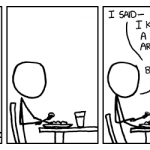Articles in the ‘Speaking’ category Page 10
-
About fossilisation and improving your Chinese pronunciation
It’s a fact that most foreign adults don’t acquire native like pronunciation in Chinese, but what’s the reason? In most debates at this point, someone will throw in the word “fossilisation”, as if that actually explained anything. This article is about why the concept of fossilisation is bunk and how we should think about adult pronunciation instead.
Read → -
Do you really know how to count in Chinese?
Counting in a foreign language is one of the first things we learn, yet it takes very long to master numbers in Chinese. Most students abandon practising numbers too early, leading to a surprising and serious gap in our knowledge: we simply don’t know the numbers as well as we think we do, which will cause problems both in real life and in listening comprehension tests. Do you really know how to count in Chinese? Tests included!
Read → -
Role-playing as a way to expand your Chinese
When learning a language, we naturally become very good at what we do often, but expanding our knowledge beyond our personal sphere of experience is an essential step to take. Role-playing is a useful tool that can be employed to take this step. Practice with a friend and create new situations or new persons, all depending on which area you feel you need to improve in.
Read → -
Using Audacity to learn Chinese (speaking and listening)
Audacity is a marvellous piece of software that allows you to record audio (yourself, other people or whatever is playing on your computer), mimic native speakers, edit and enhance the audio, as well as automatically manipulate multiple files, such as lecture or lesson recordings. In short, Audacity is a really good program for learning languages. This article introduces the software both through a video example and explaining text.
Read → -
Improving your Chinese by translating from another language
I think translation is one of the best ways of improving writing ability. Translation forces you into linguistic environments you wouldn’t have ended up in if you wrote the article yourself. This article is about how translation can be used to improve your written Chinese.
Read → -
Vocalise more to learn more Chinese
Do you know how to make your passive learning more active and thereby learn a lot more Chinese? This article is about how you can increase your awareness of the language around you, process it more actively and therefore also learn more from the experience.
Read → -
Language is communication, not only an abstract subject to study
I won’t join the group of language bloggers who claim that classroom learning is meaningless, but I do believe there are good reasons to create links to the real world. Not only is this a motivational booster, it’s also an excellent way of identifying problems you might have with your Chinese.
Read → -
When perfectionism becomes an obstacle to progress
Perfectionism is usually regarded as something positive, perhaps even necessary. Scoring 100% on an exam is good, isn’t it? No, it’s not. In this article, I explain why perfectionism is bad when learning a language. Aiming for 90% is far better than aiming for 100%. This is being smart, not lazy.
Read → -
Making progress in Chinese in spite of praise
Praise is a double-edged sword. On the one hand, it’s encouraging and makes it more rewarding to study. On the other hand, however, if you use other people’s praise as a true indication of your own ability, you’re in deep trouble. Feel encouraged, but it’s essential that you don’t trust native speakers when they tell you your Chinese is great!
Read → -
Learn by exaggerating: Slow, then fast; big, then small
If you want to speak or write quickly, you should start out by doing it slowly. Mimicking native speed early will just lead to sloppy language and bad communication. Expose your errors so that you have a chance to correct them.
Read →









